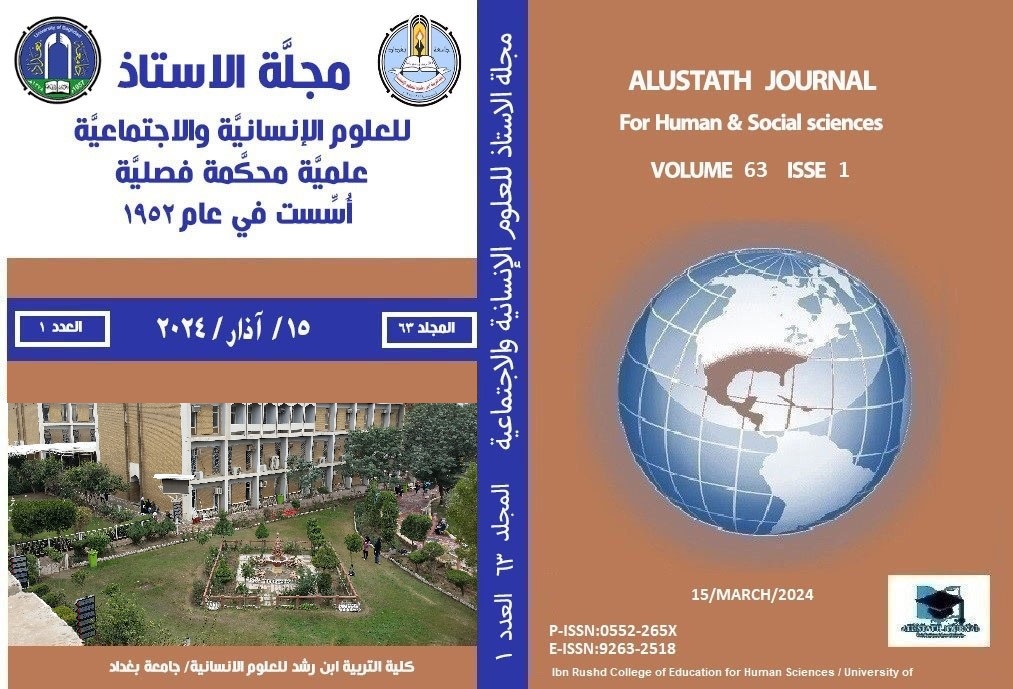The act of translating between Literal translation and interpretive translation reading of the Persian translation of the titles of Arabic novels
DOI:
https://doi.org/10.36473/e8e63j62Keywords:
Multiple meanings, literal and interpretation, context of knowledge, recipient actor, text, difference.Abstract
The most important element of reading a text that drives the process of reading is "unlimited freedom". It is the element that the leaders of the reception theory have focused on, in constructing the meanings with the basis of diversity and difference. It is the diversity itself which carries the reader to give his response in an interactive framework between the writer and recipient. Translating from this perspective is a deconstruction and construction. To understand a text, we deconstruct and then build it again to formulate it in another artistic form because the translation is a communicative practice in the first place of its strong affiliation to the cultural context.
There are two important types of translation; literal/ direct translation and interpretive translation. Interpretive translation motivates a sense of enjoyment with the reader, whereas the literal translation is a faithful process even if it has surprised the reader. Perhaps it is the translation of interpretation that generates pluralism, and it is a type of reading that calls for openness and multiple sense of meanings. From this perspective, interpretation is responsible for pluralism and difference in the first place, where there is no absolute original meaning, since the translation itself is the "difference" which opens the appearance of semantic meanings.
Based on the theory of “originality of difference”, our study seeks to find effective strategies and methods of translating the titles of Arabic narratives into Persian, in the light of the literal and interpretive translation strategies. We have seen through the selected models, like other titles, that interpretive translation is not looking for lexical reward, but with something is called "rhetorical reward". We do not translate the language, rather we translate the discourse. In accordance with the principle of difference, we have noted that the translation was followed by the reception elements, which the translator could not control. We also noted that translation should permit for cultural diversity.
Downloads
References
المصادر
- باسنت، سوزان،(2012م)، دراسات الترجمة، ترجمة فؤاد عبدالمطلب، دمشق: الهیئة العامة السوریة للكتاب.
- برمان، أنطوان، (2010)، الترجمة والحرف أو مقام البُعد، ترجمة عزالدین الخطابي، بیروت: مرکز دراسات الوحدة العربیة.
- بنعبدالعالي، عبدالسلام، (2017م)، الترجمة أداةً للاعتراف، ضمن كتاب "الترجمة وإشكالات المثاقفة"، المجلد3.
- بنیامین، فالتر، (1988م)، مقالات مختارة، ترجمة: أحمد حسان، بلا مكان.
- بو عزة، عصام، (2016م)، ترجمة القرآن الكریم بین الدعوة والمثاقفة، ضمن كتاب "الترجمة وإشكالات المثاقفة"، المجلد2، الدوحة: منتدی العلاقات العربیة والدولیة.
- حمودة، عبدالعزیز، (2003م)، الخروج من التیه: دراسة في سلطة النص، الكویت: عالم المعرفة.
- خراقي، عبدالنور، (2016م)، الترجمة بین البحث عن الذات والخوف من الآخر، ضمن كتاب "الترجمة وإشكالات المثاقفة"، المجلد2، الدوحة: منتدی العلاقات العربیة والدولیة.
- سلدن، رامان، (1996م)، النظریة الأدبیة المعاصرة، ترجمة سعید الغانمي، عمان: دار الفارس للنشر والتوزیع.
- فلیري، بول، (2009م)، سر الترجمة وهاجس التأویل، ضمن كتاب: التأویل والترجمة : مقاربات لآلیات الفهم والتفسیر، بیروت: الدار العربیة للعلوم ناشرون.
- القاضي، محمد وآخرون (2010م)، معجم السردیات، تونس: دار محمد علي للنشر.
- عجل ألیفا، عبدالمنعم، (2015م)، في نقد التفكیك: نصوص مختارة مع مقدمة نقدیة شاملة، بیروت: دارالعربیة للعلوم ناشرون.
- ناظم، حسن، (2016م)، الترجمة والتعددیة الثقافیة: تحویل التهدید إلی المثاقفة، ضمن كتاب "الترجمة وإشكالات المثاقفة"، الدوحة: منتدی العلاقات العربیة والدولیة.
- الطوبي، مصطفی، (2016)، ترجمة الأدب بین الأمانة والإبداع الموازي: قصیدة "غزیلة حزینة" لبودلیر نموذجا، ضمن كتاب "الترجمة وإشكالات المثاقفة"، الدوحة: منتدی العلاقات العربیة والدولیة.
- لادمیرل، جان رینیه، (2011)، التنظیر في الترجمة، ترجمة محمد جدیر، بیروت: مركز دراسات الوحدة العربیة.
- لطیفة، عمیرة، (2017م)، «الترجمة ومفارقات الهویة»، مجلة العربیة والترجمة، العدد29، ص149-163.
- لودوریر، ماریان، (2012)، الترجمة: النموذج التأویلي، ترجمة فایزة القاسم، بیروت: مرکز دراسات الوحدة العربیة.
Reference
- Ajb Alifa, Abdel Moneim, (2015), In Criticism of Deconstruction: Selected Texts with a Comprehensive Critical Introduction, Beirut: Dar Al-Arabiya for Science Publishers.
- Basnett, Suzanne, (2012), translation studies, translated by Fouad Abdel-Muttalib, Damascus: The Syrian General Authority for Books.
-Ben Abdelali, Abdel Salam, (2017), translation as a tool for recognition, in the book “Translation and Problems of Acculturation,” Volume 3.
- Benjamin, Walter, (1988), selected articles, translated by: Ahmed Hassan, without a place.
- Bou Azza, Essam, (2016), translating the Holy Qur’an between advocacy and acculturation, within the book “Translation and Problems of Acculturation,” Volume 2, Doha: Forum for Arab and International Relations.
- Hamouda, Abdel Aziz, (2003), Exit from the Labyrinth: A Study in the Authority of the Text, Kuwait: The World of Knowledge.
- Kharraki, Abdelnour, (2016), translation between self-searching and fear of the other, in the book "Translation and the Problems of Acculturation", Volume 2, Doha: Forum for Arab and International Relations.
- Selden, Raman, (1996), Contemporary Literary Theory, translated by Saeed Al-Ghanmi, Amman: Dar Al-Faris for Publishing and Distribution.
- Flairy, Paul, (2009), The Secret of Translation and Obsession with Interpretation, within the book: Interpretation and Translation: Approaches to the Mechanisms of Understanding and Interpretation, Beirut: Arab House of Science Publishers.
- Latifa, Omaira, (2017), “Translation and Identity Paradoxes,” Al-Arabiya and Translation Magazine, Issue 29, pp. 149-163.
- Lade merle, Jean Rene, (2011), Theorizing in Translation, Translated by Muhammad Jadir, Beirut: Center for Arab Unity Studies.
- LeDourier, Marianne, (2012), Translation: The Interpretive Model, translated by Fayza Al-Qasim, Beirut: Center for Arab Unity Studies.
– Nazim, Hassan, (2016), Translation and Cultural Pluralism: Transforming the Threat into Acculturation, in the book "Translation and the Problems of Acculturation", Doha: Forum for Arab and International Relations.
- Al-Qadi, Muhammad and others (2010), Dictionary of Narratives, Tunisia: Muhammad Ali Publishing House.
- Al-Toubi, Mustafa, (2016), translating literature between honesty and parallel creativity: the poem "Sad Ghazila" by Baudelaire as a model, within the book "Translation and the Problems of Acculturation", Doha: Forum for Arab and International Relations.
Downloads
Published
Issue
Section
License
Copyright (c) 2024 Fatima Araji

This work is licensed under a Creative Commons Attribution 4.0 International License.











